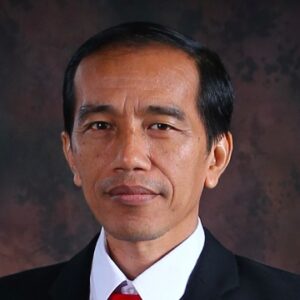Indonesia’s current President, Joko Widodo, has been in office since October 2014. During the presidential election in mid-2014, there was some controversy, but he was eventually declared the winner by the General Elections Commission. After holding several other positions in the Indonesian administration, he was elected as the country’s 7th President. Widodo was born into a poor family in Surakarta, and as a member of the underprivileged section of society, he faced many challenges. He had to start working as a young boy to support his family and pay for his own education due to the family’s dire financial situation. He was a hard worker and an astute student who earned a degree in forestry engineering from Yogyakarta’s prestigious Gadjah Mada University. He eventually entered politics and was elected to the position of Jakarta governor. He became very popular in both the urban and rural areas of the country, and he rose through the ranks, eventually becoming President. Citizens hold him in high regard because he is seen as a trustworthy and principled politician who understands the problems of ordinary people.
Childhood and Adolescence
He was born in Surakarta, Indonesia, on June 21, 1961, to Noto Mihardjo and Sudjiatmi Notomihardjo. He is the eldest of three sisters. His family lived in shacks that were built illegally and were frequently evicted by the government.
He received his primary education at Tirtoyoso’s State Primary School 111, which was designed specifically for the poorer members of society. He also began working in his father’s furniture workshop at the age of 12 to help pay for school supplies. Despite all of his difficulties, he did well in school.
He attended Gadjah Mada University’s Forestry Faculty after finishing high school, where he studied the structure of wood, its use, and technology. He received his diploma in 1985.
Career of Joko
He got a job with BUMN PT Kertas Kraft Aceh and was assigned to the Gayo Highlands Pinus merkusii forest plantation. However, he was dissatisfied with his current position and desired to start his own company.
In 1988, he founded CV Rakabu, which he still runs today. It had to be shut down due to fraud, despite the fact that it was initially successful. He was not one to give up easily, and by 2002 he had re-established his business and was a very successful furniture exporter.
He was also the chairman of a local branch of the influential furniture manufacturers’ association in the country.
He decided to enter politics in 2005, and as a member of the Indonesian Democratic Party of Struggle, he ran for mayor of Surakarta. People were skeptical of him at first because he was primarily a businessman with no political ties.
He won the elections and quickly disproved his critics by implementing a slew of progressive reforms throughout the city. He earned a lot of respect as mayor for his progressive reforms and his honesty, which set him apart from other politicians. He developed a rapport with the people because he had risen to this position from a low-income family and could thus relate to people from all walks of life.
He frequently visited impoverished neighborhoods to interact with residents and refused to be paid for his public service. This enhanced his reputation as a trustworthy individual who cared about the general public. In 2010, he easily won re-election with over 90% of the vote and was re-elected mayor for a second term.
In 2012, he decided to run for the governorship of Jakarta. Widodo was running against the incumbent, Fauzi Bowo, in the election and easily defeated him in the second round. He implemented many policies to encourage small businesses and focused on improving Jakartans’ access to health care and education as the governor of Jakarta.
He once again demonstrated his ability to lead effectively while empathizing with the poor. He went to the poor areas on a regular basis to talk to the people about the problems they were having with food prices, access to medical facilities, housing, and infrastructural amenities. He dressed simply and led a simple life, which allowed him to connect with ordinary people.
In Jakarta, he implemented a universal healthcare program based on the popular Healthy Jakarta Card (Kartu Jakarta Sehat or KJS). He also introduced the “Smart Jakarta Card” to assist poor students by providing them with a stipend that can be withdrawn from ATMs and used to purchase school supplies.
Megawati Sukarnoputri, the leader of the Indonesian Democratic Party of Struggle, chose Joko Widodo as her party’s presidential candidate in 2014. His mayorship in Surakarta and governorship in Jakarta had earned him widespread respect and popularity.
He defeated his opponent Prabowo Subianto with more than 53 percent of the vote in the election. On October 20, 2014, he was sworn in as Indonesia’s 7th President.
Widodo is Indonesia’s first president who is not a member of the military or political elite. As president, he is concentrating on reducing corruption in the Indonesian government and taking steps to increase foreign direct investment in the country.
He’s also enacted land reforms, improved public services, and launched healthcare and educational initiatives.
Major Projects of Joko
He introduced a universal health care program based on the ‘Healthy Jakarta Card’ after becoming Jakarta’s governor. The plan proved to be extremely popular.
Achievements & Awards
In 2011, the Indonesian government awarded him the Bintang Jalasena Utama, 1st Class (“Navy Meritorious Service Star”).
In 2014, he was awarded the Bintang Republik Indonesia Adipurna, a first-class “Star of the Republic of Indonesia.”
The International City Mayors Foundation once ranked him as the world’s third best mayor.
Personal History and Legacy
He and Iriana have three children: Gibran Rakabuming Raka and Kaesang Pangarep, two sons, and Kahiyang Ayu, adaughter.
Estimated Net Worth
Joko Widodo is one of the wealthiest and most popular politicians in the world. Joko Widodo’s net worth is estimated to be $3.5 million, according to Wikipedia, Forbes, and Business Insider.


